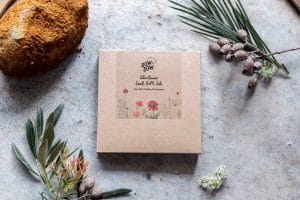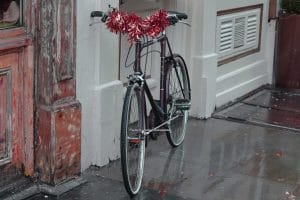While Christmas is a magical time of the year, sadly it’s also one of the most wasteful with rubbish volumes increasing in Australia by 30% during this holiday period. The good news is you can reduce your environmental impact this Christmas and enjoy all the wonderful aspects that make this time so special, you just have to be more mindful of how your actions impact the environment. From the presents you buy to how you travel, there are many simple ways to make Christmas more sustainable.
28 tips to reduce your environmental impact this Christmas
Give more sustainable gifts
The gifts you choose to give at Christmas can have a lasting impact on the planet. From the materials they’re made of to where they’re created and how they’re used or disposed of after Christmas, there are many elements to consider when shopping for sustainable gifts. If you want to reduce your environmental impact this Christmas, discover some unique ways to find or create sustainable gifts below.
Choose sustainable gifts: Purchasing ethically and sustainably made gifts is the best way to reduce your environmental impact this Christmas. It not only minimises the amount of unwanted presents given at Christmas, but it also reduces the waste associated with these gifts. Luckily, there are more sustainable gift options available as we become more eco-aware and choose to buy and happily receive sustainably made gifts. Before purchasing any present, consider the materials it is made of, where it is made and how it can be disposed of at the end of its life.
Make your gifts: There’s nothing more heart-warming than receiving a gift that a friend or family member has lovingly made. If you’re a great cook or can sew, knit or create beautiful craft items, try making gifts this Christmas instead of purchasing them from the shops. From homemade marmalade and rum balls to tote bags and candles, there are many wonderful Christmas gifts you can make for your loved ones. Search Pinterest to source ideas.
Support local makers: Shopping for sustainable and locally made gifts will not only help to reduce your environmental impact this Christmas, but you’re more likely to purchase unique and original products that can’t be found in the big shopping centres. Shopping locally also boosts your local economy by keeping money circulating within your community and supporting local jobs.
Buy essential items: If you’re shopping for gifts and you’re unsure what to buy someone, giving essential items is a great way to ensure the gifts you give will be used and not sit in a cupboard or end up in landfill. Items like handmade soaps, gourmet food, alcohol, or beauty products make wonderful, useful gifts.
Re-gift: Why keep a gift you’ve received that you’re not going to use when you can re-gift it to someone who will? While some people frown upon re-gifting, it’s a great way to avoid waste and pass on presents in a meaningful way.
Experiences: If you’re unsure what to give to someone, why not buy them a gift experience such as cooking, surfing or golf lessons, growing seeds, or movie tickets? Experience-style gifts are not only less wasteful, but they will provide a wonderful memory for the recipient to enjoy long after they’ve used their gift.
Second-hand gifts: One of the best ways to reduce your environmental impact this Christmas is to purchase second-hand gifts instead of buying brand new ones. This not only saves you lots of money, but it keeps items circulating that have already been made. Facebook Marketplace, Gumtree, op-shops and tip shops are great places to search for second-hand gifts.
Your time: If you’re strapped for cash, giving your time as a gift can be the best gift for someone who needs a hand. Whether it’s time spent sprucing up their garden, cleaning their windows, cooking dinner or doing their grocery shopping, there are many ways you can give someone the gift of your spare time.
Donation: If you love delivering gifts that give you and the recipient the warm and fuzzies, then choose a donation gift and select a charity to donate to. It could be a cause the recipient is passionate about such as saving animals or the environment.
Reduce food waste
One of the most loved parts of Christmas is gathering around the table with family and friends and enjoying a long lunch or dinner. It’s also the cause of a lot of waste. Sadly, food waste in Australia is already a big issue. Collectively Aussies throw away more than $36 billion worth of food each year, which only accelerates during the Christmas season. This year, make it your mission to reduce the environmental impact of your Christmas food waste by following the tips below.
Shopping list: Santa shouldn’t be the only person making a list and checking it twice. Making a shopping list is not only great for present shopping but for groceries too. It will not only save you money by preventing you from purchasing more food than you need, but it will also ensure there’s less food waste sent to landfill during the holiday period.
Create a menu: There’s nothing worse than aimlessly wandering around the crowded grocery aisles on Christmas eve not knowing what to purchase. Creating a menu plan for your Christmas lunch or dinner before you head out to the shops will help you to avoid overfilling your fridge and pantry with food that’s not going to be eaten by its expiry date.
Reduce packaging waste: Where possible, try to reduce food packaging waste by buying food from bulk food stores, making food from scratch or choosing foods packaged in recyclable materials such as glass, cardboard, and tins.
Reduce household energy consumption
Decreasing household energy consumption is one of the best ways to reduce your environmental impact this Christmas. But with a house full of guests and rising temperatures, this can seem challenging. Being mindful of your energy usage and following a few simple tips will help lower your energy costs. After all, a surprise you will want to avoid is receiving a hefty electricity bill after the holiday season.
Solar-powered Christmas lights: If you love decorating your house with twinkling Christmas lights, choose solar-powered lights instead of ones that require electricity. Solar lights are powered for free by the sun, so they won’t increase your electricity usage, which is a win for your wallet and the environment.
Reduce heating or cooling: As the temperature soars, it can be tempting to blast the air conditioner for a reprieve from the heat and make the house feel more comfortable. The downfall of running your air conditioner is it not only dramatically increases your electricity bill costing you more in the future, but it also puts pressure on the electricity grid and the environment. Try cooling down by sitting in a cooler place in your home, using fans to circulate the air or taking a dip in a pool, lake, beach or creek.
Unplug appliances: Did you know that 10% of your power usage is created from appliances that are on standby? Avoid spending extra money on unnecessary energy and wasting electricity by switching off all your appliances when they’re not in use.
Use a power timer: If you already have electric Christmas lights, use a timer to reduce your energy usage and automatically turn off your lights when you’ve gone to bed or aren’t home. After all, there’s no need for the lights to be on show when everyone has gone to bed.
Consider alternative travel options
The Christmas holidays are undoubtedly the best time to see family and friends. Most people take extended breaks giving them more time to catch up with loved ones they haven’t seen in a while. If you’re keen to reduce your environmental impact this Christmas, keep these travel tips in mind when roaming around.
Carpool: It’s no surprise that traffic increases dramatically over Christmas as people spend time travelling to see loved ones. Gathering a bunch of people heading to the same destination as you is not only a great way to reduce the number of cars on the road but it’s also a simple way to reduce greenhouse gas emissions. It’s also more fun travelling with others than alone, and a great way to save money. If you can’t find anyone to carpool with, there are many rideshare apps that connect drivers and passengers.
Travel off-peak: If you need to drive, travel during off-peak hours or days, such as later in the evening or early in the morning when fewer people are on the road. You will not only avoid having to sit in traffic, but you will also reduce the greenhouse gas emissions you produce while driving, which tends to increase as traffic gets heavier.
Use public transport: An easy way to reduce your environmental impact this Christmas is to catch public transport over driving your car. Understandably, there might not be suitable public transport options for some people, but if there’s an opportunity for you to take a bus, train or tram to your destination, why not give it a go rather than driving your car? There are so many benefits to using public transport. It’s not only a great way to reduce your environmental impact by cutting back on greenhouse gas emissions, but you won’t have to battle the traffic, and you can sit back and enjoy the ride.
Ride, scooter, skateboard or walk: While it can be tempting to jump in your car to make a quick trip to the corner store to make a last-minute purchase, these short trips still emit unnecessary carbon into the atmosphere. Where possible, opt for more sustainable travel alternatives like riding a bike, scooter or skateboard, walking or jogging. It’s not only a great way to reduce your environmental impact but it will also help to increase your daily exercise.
Carbon offset your flights: If you have to fly during the Christmas holidays, choose an airline that offers a Carbon Offset program that allows you to balance the carbon emissions created from your flights by funding environmentally friendly projects.
Consider waste free wrapping
Ripping into a present at Christmas time is one of the most loved activities of the holiday season. It’s full of surprise, wonder and delight. Sadly, it’s also a wasteful activity, but it doesn’t have to be. You can still enjoy giving and receiving wrapped gifts. Just wrap them differently. Discover our top sustainable gift wrapping tips below to help you reduce your environmental impact this Christmas.
Use recyclable paper: When wrapping gifts, carefully consider the paper you use. Choose plain paper with a print or kraft paper, as these varieties can be recycled. Foil or plastic wrapping paper or paper that contains glitter can’t be recycled.
Furoshiki: Furoshiki wrapping is the Japanese technique of wrapping items in fabric with the idea that the fabric is kept for future wrapping. You can purchase special Furoshiki fabric wrapping cloths. Otherwise, you can use other fabric gift elements that form part of the gift, such as a shirt, tea towel or apron. Learn more about Furoshiki wrapping here.
Gift bags and boxes: The wonderful aspect of wrapping gifts in gift bags and boxes is they can be reused again and again, maximising the value of the materials used to produce the items in the first place.
DIY paper: If you love crafting or have kids, try making your own wrapping paper from plain recycled butchers or kraft paper. Use paint, coloured pens, pencils or crayons, or recyclable items you find around the home to create the most unique Christmas wrapping paper.
Reduce excess unnecessary waste
While we’ve listed above some of the best ways to reduce your environmental impact this Christmas, there are a few more simple ways you can reduce unnecessary waste at this time. Here are our last three tips.
Ditch the Christmas crackers: While it’s a fun tradition to pop a Christmas bonbon before devouring lunch or dinner, this small celebration that only lasts a few minutes creates a small mountain of waste usually consisting of paper, ribbon and small plastic items destined for landfill. Make a positive change to this Christmas tradition by learning to make your own Christmas bonbons from recycled materials such as empty toilet paper rolls, paper and twine. Swap plastic toys for sustainable gifts including seeds, wooden decorations, or funny jokes.
Avoid using disposable plates and cutlery: If you have a big Christmas lunch or dinner celebration planned, it can be enticing to purchase disposable cutlery, bowls, and plates to minimise the amount of dishes needing to be cleaned at the end of the day, but this only contributes to more single use waste filling your household garbage bin. The best way to avoid this waste is to use reusable cutlery and crockery. If you’re feeding a large crowd, break down the job by asking everyone to wash their dish once they’ve finished using it.
Stop buying plastic Christmas decorations: When purchasing decorations for your tree, be mindful of the materials they are made from. Choose decorations made from paper, timber, fabric, glass or recycled metals or plastic decorations.











